Cecil Mills Collection - Wallet 7 - Part 2 of 2
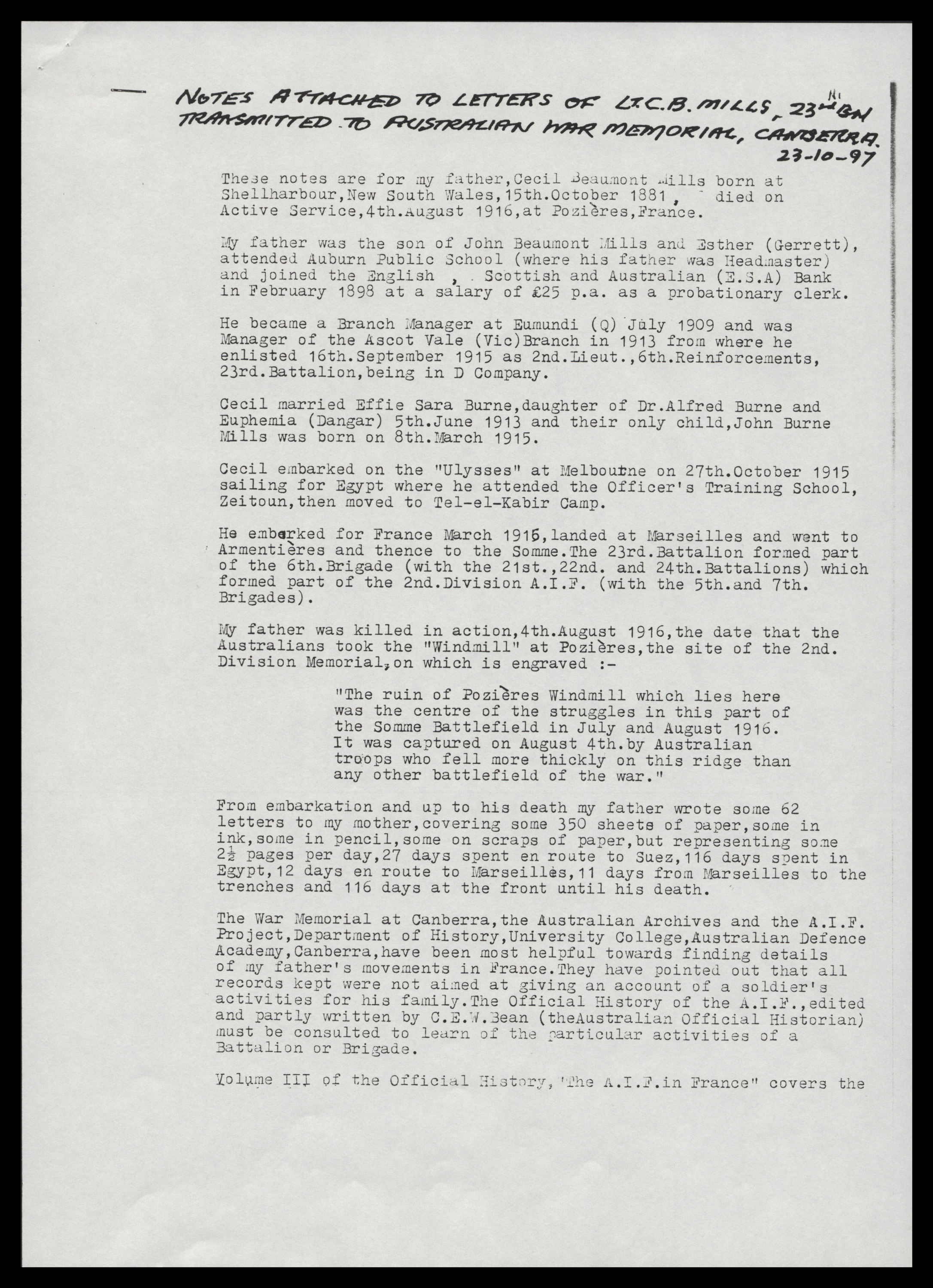
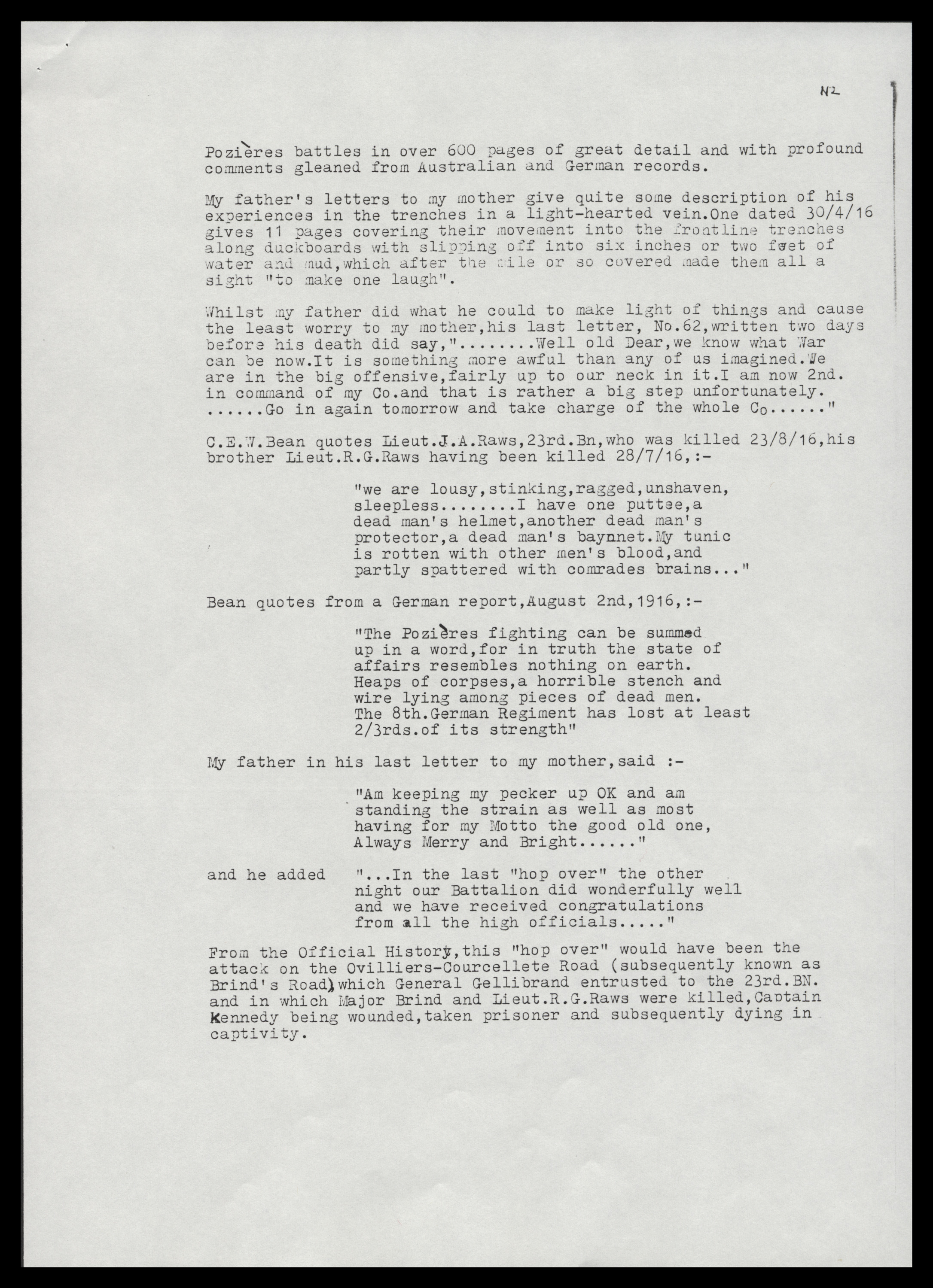
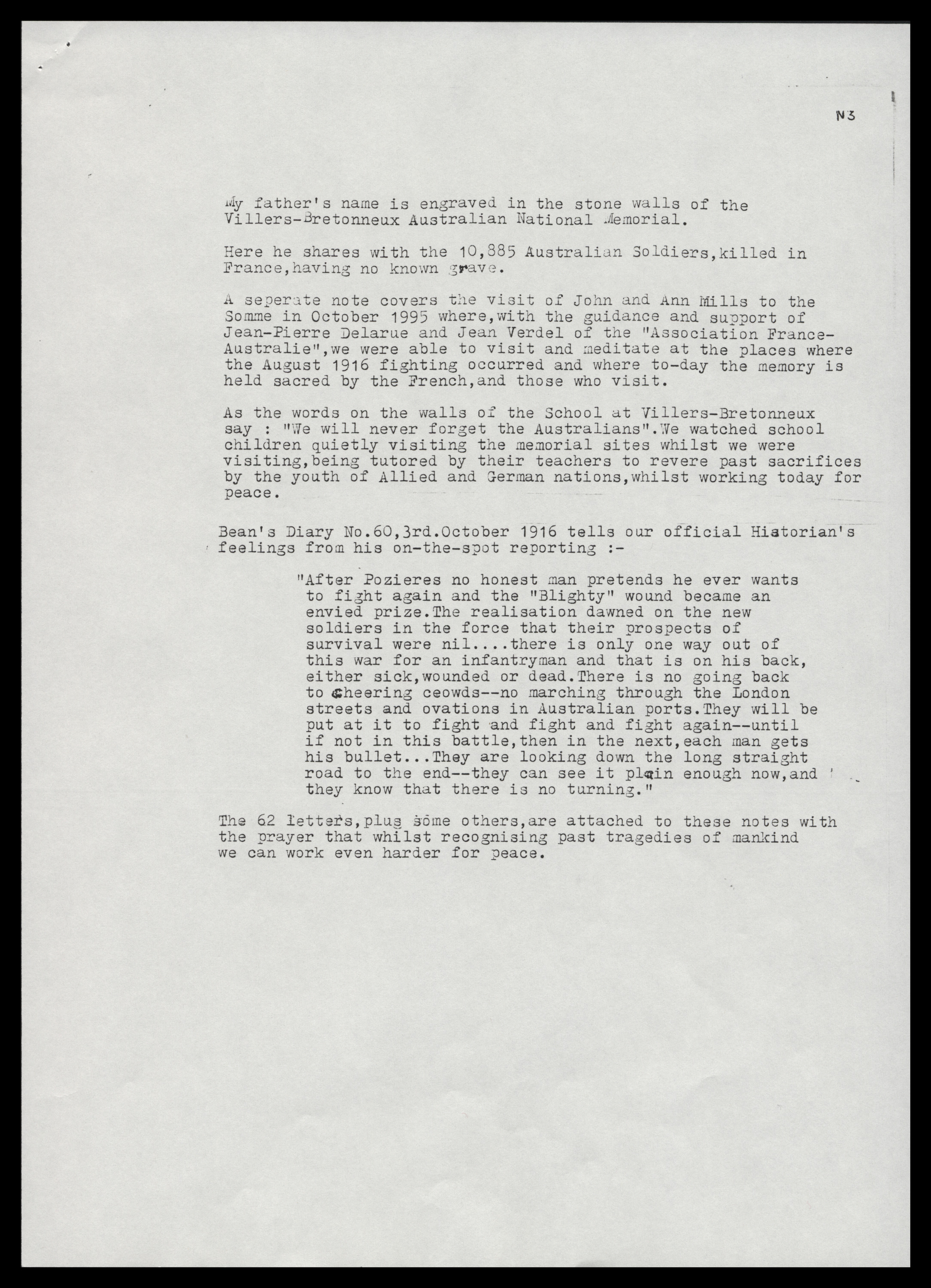
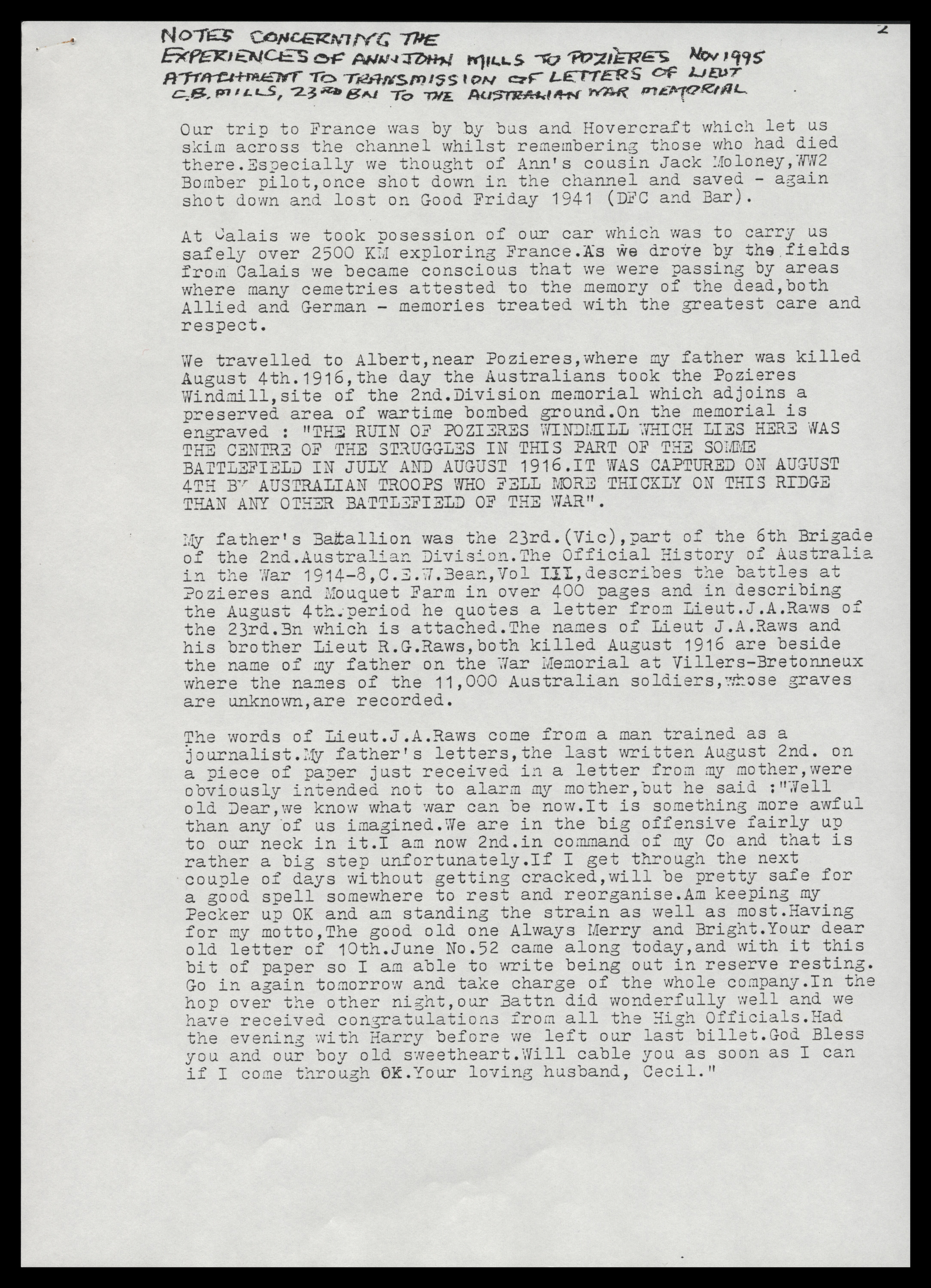
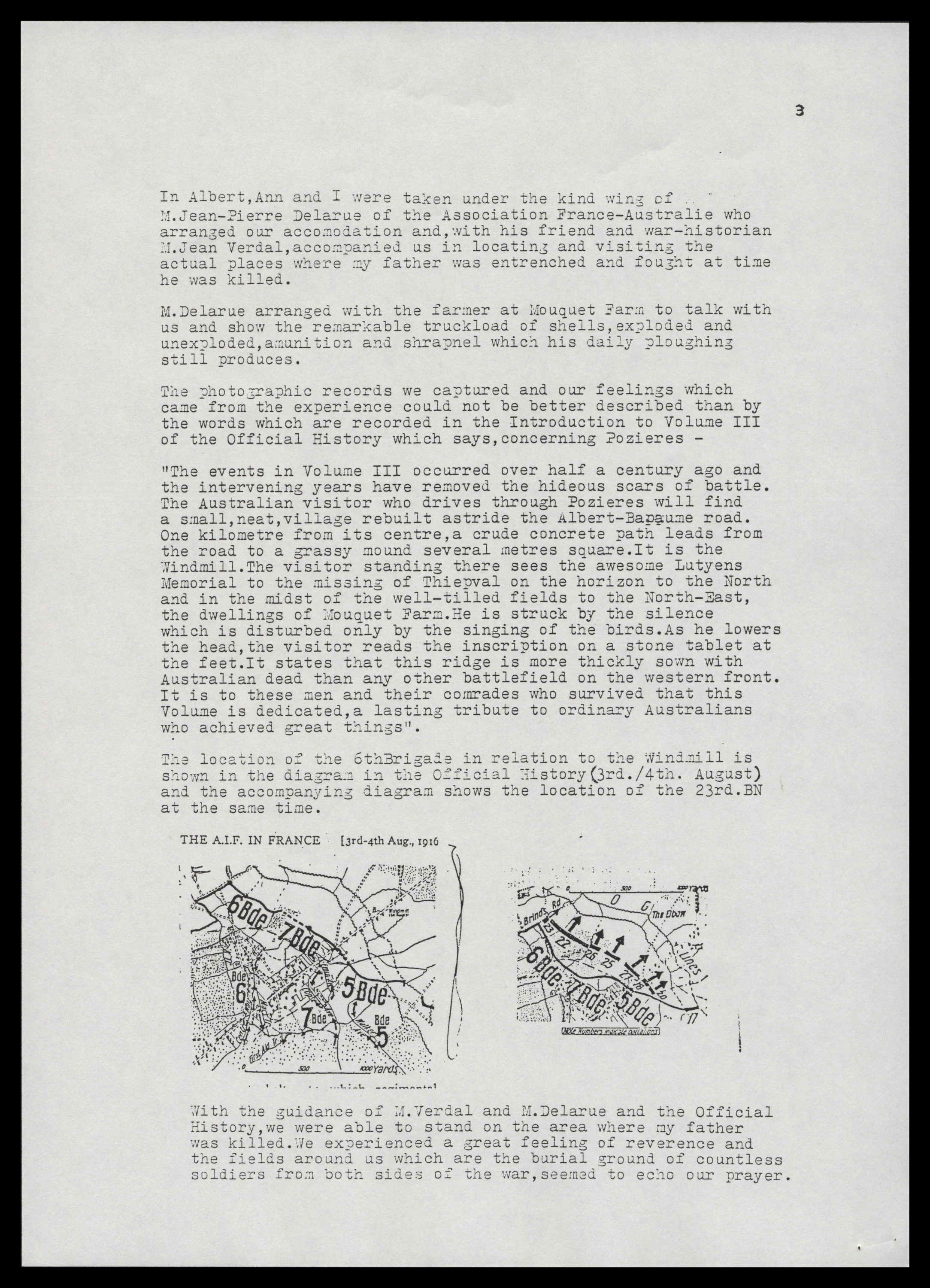
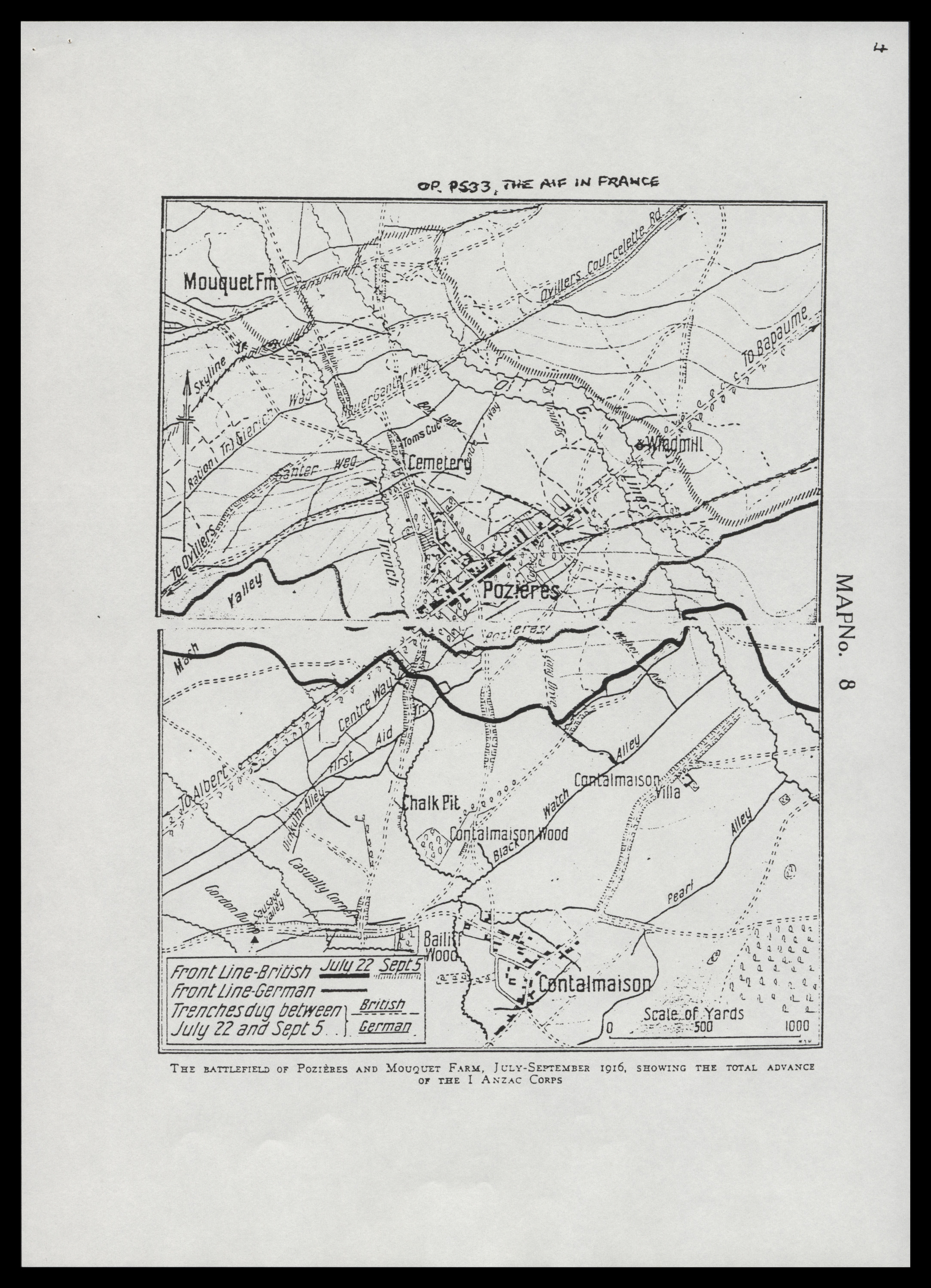
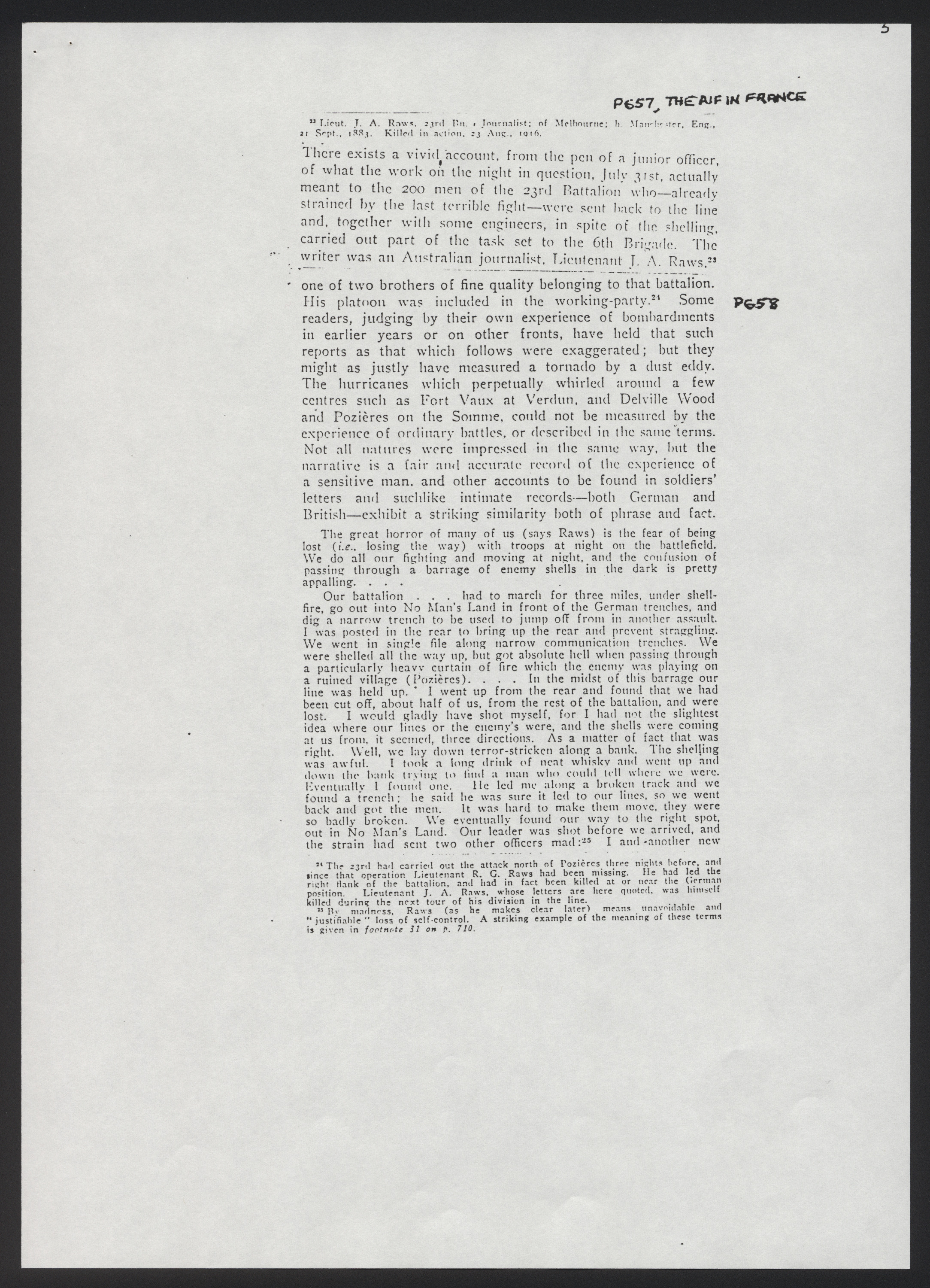
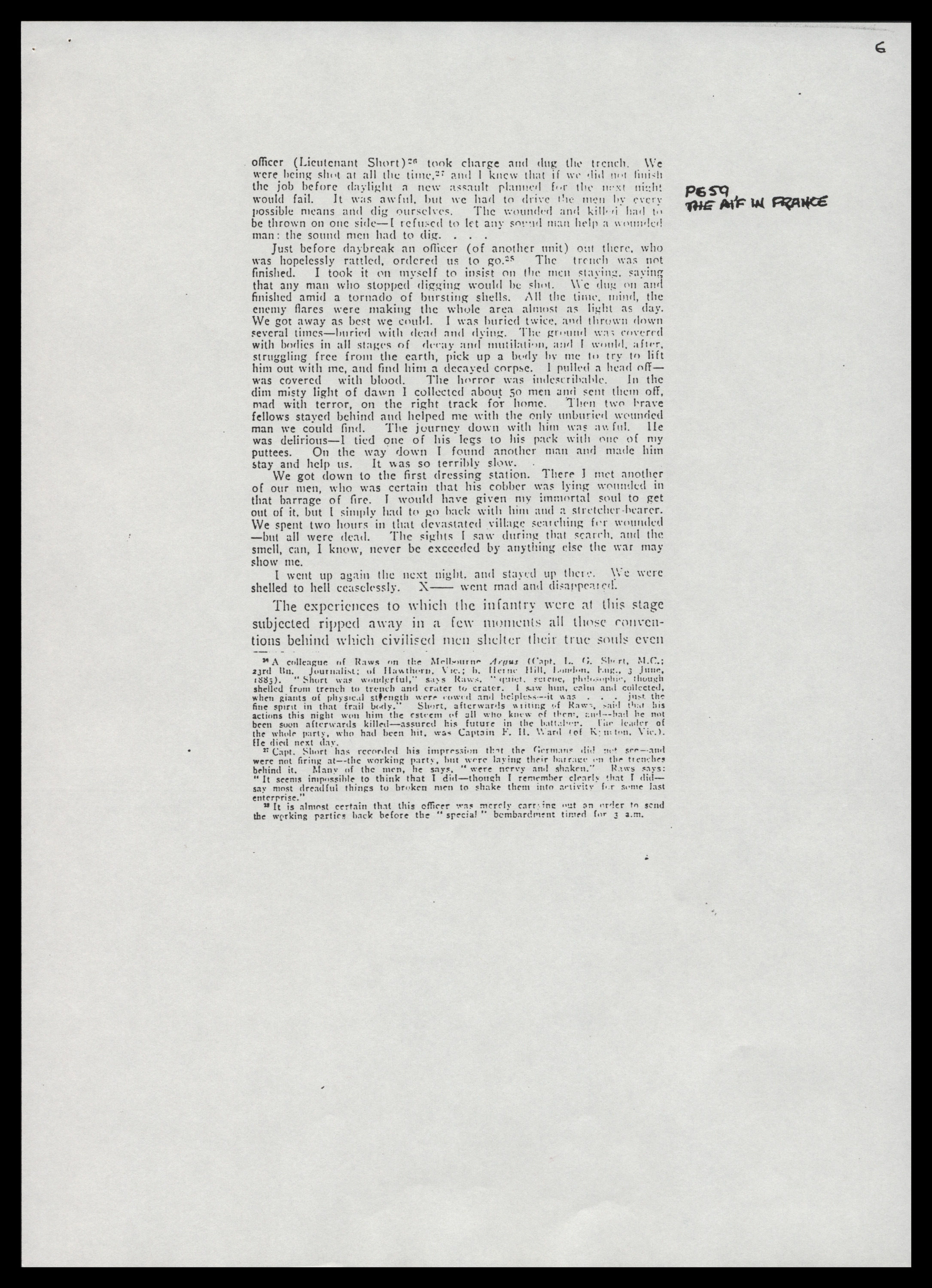
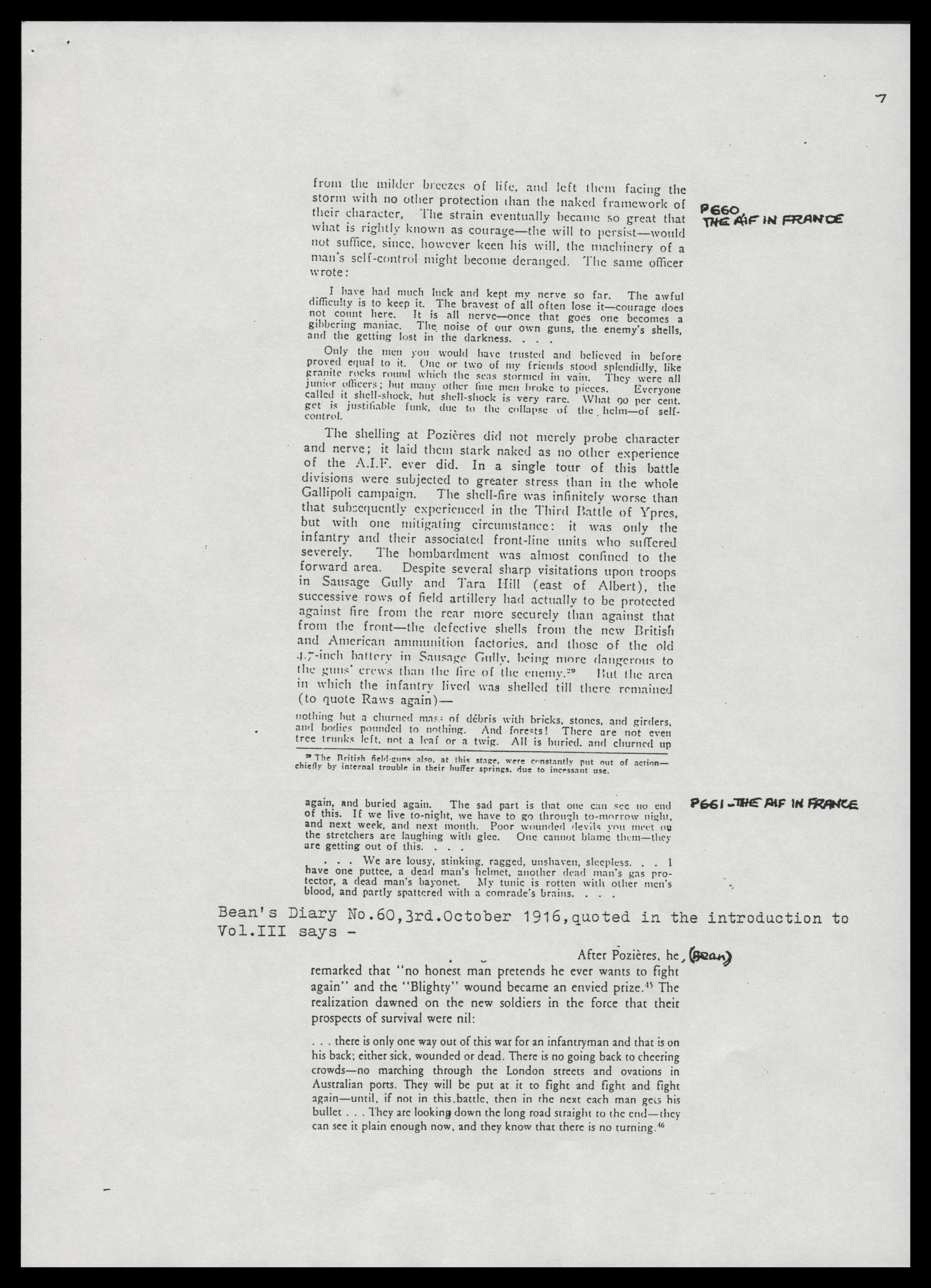
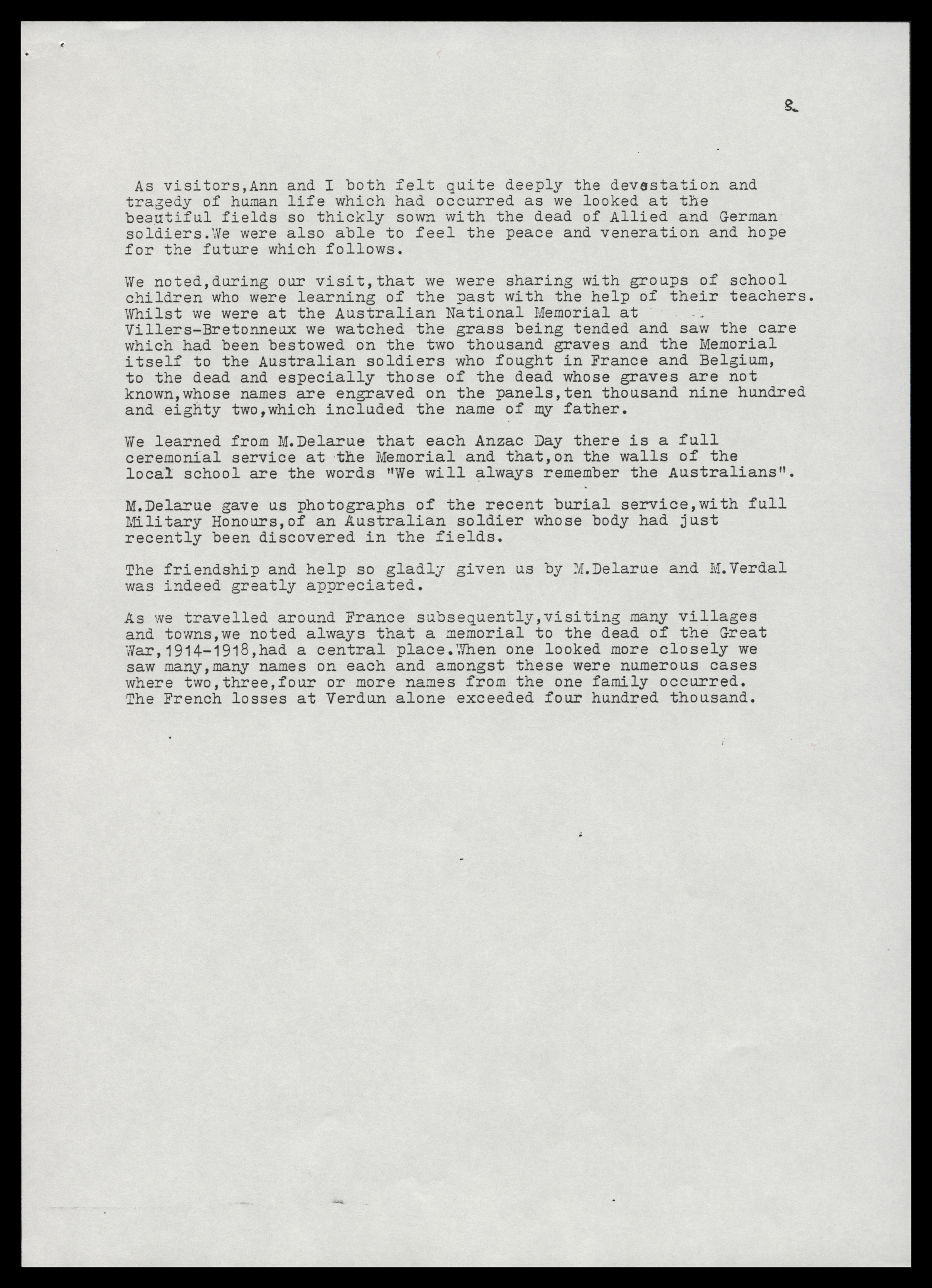
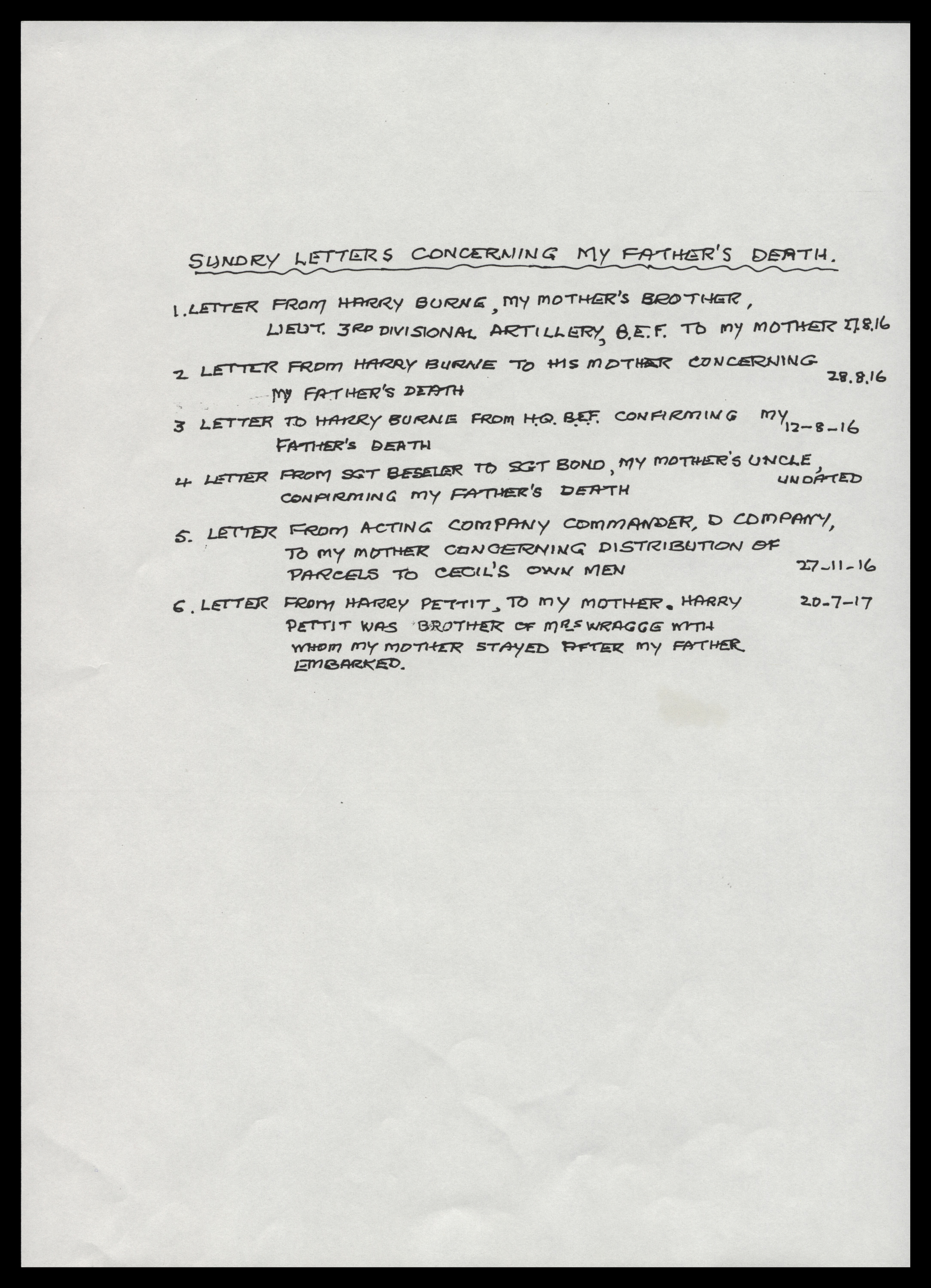
N1
NOTES ATTACHED TO LETTERS OF LT.C.B.MILLS, 23rd BN
TRANSMITTED TO AUSTRALIAN WAR MEMORIAL, CANBERRA.
23-10-97
These notes are for my father, Cecil Beaumont Mills born at
Shellharbour, New South Wales, 15th.October 1881, died on
Active Service,4th.August 1916, at Pozières, France.
My father was the son of John Beaumont Mills and Esther (Gerrett),
attended Auburn Public School (where his father was Headmaster)
and joined the English , Scottish and Australian (E.S.A) Bank
in February 1898 at a salary of £25 p.a. as a probationary clerk.
He became a Branch Manager at Eumundi (Q) July 1909 and was
Manager of the Ascot Vale (Vic) Branch in 1913 from where he
enlisted 16th.September 1915 as 2nd.Lieut.,6th.Reinforcements,
23rd.Battalion, being in D Company.
Cecil married Effie Sara Burne,daughter of Dr.Alfred Burne and
Euphemia (Dangar) 5th.June 1913 and their only child,John Burne
Mills was born on 8th.March 1915.
Cecil embarked on the "Ulysses" at Melbourne on 27th.October 1915
sailing for Egypt where he attended the Officer's Training School,
Zeitoun, then moved to Tel-el-Kabir Camp.
He embarked for France March 1916, landed at Marseilles and went to
Armentières and thence to the Somme.The 23rd.Battalion formed part
of the 6th.Brigade (with the 21st.,22nd. and 24th.Battalions) which
formed part of the 2nd.Division A.I.F. (with the 5th.and 7th.
Brigades).
My father was killed in action,4th.August 1916, the date that the
Australians took the "Windmill" at Pozières, the site of the 2nd.
Division Memorial, on which is engraved :-
"The ruin of Pozières Windmill which lies here
was the centre of the struggles in this part of
the Somme Battlefield in July and August 1916.
It was captured on August 4th.by Australian
troops who fell more thickly on this ridge than
any other battlefield of the war."
From embarkation and up to his death my father wrote some 62
letters to my mother, covering some 350 sheets of paper, some in
ink, some in pencil, some on scraps of paper, but representing some
2½ pages per day, 27 days spent en route to Suez, 116 days spent in
Egypt, 12 days en route to Marseilles, 11 days from Marseilles to the
trenches and 116 days at the front until his death.
The War Memorial at Canberra, the Australian Archives and the A.I.F.
Project,Department of History,University College,Australian Defence
Academy,Canberra, have been most helpful towards finding details
of my father's movements in France.They have pointed out that all
records kept were not aimed at giving an account of a soldier's
activities for his family.The Official History of the A.I.F.,edited
and partly written by C.E.W.Bean (theAustralian Official Historian)
must be consulted to learn of the particular activities of a
Battalion or Brigade.
Volume III of the Official History, "The A.I.F.in France" covers the
N2
Pozières battles in over 600 pages of great detail and with profound
comments gleaned from Australian and German records.
My father's letters to my mother give quite some description of his
experiences in the trenches in a light-hearted vein.One dated 30/4/16
gives 11 pages covering their movement into the frontline trenches
along duckboards with slipping off into six inches or two feet of
water and mud, which after the mile or so covered made them all a
sight "to make one laugh".
Whilst my father did what he could to make light of things and cause
the least worry to my mother, his last letter, No.62, written two days
before his death did say, "……Well old Dear, we know what War
can be now.It is something more awful than any of us imagined.We
are in the big offensive,fairly up to our neck in it.I am now 2nd.
in command of my Co.and that is rather a big step unfortunately.
……Go in again tomorrow and take charge of the whole Co......"
C.E.W.Bean quotes Lieut.J.A.Raws,23rd.Bn, who was killed 23/8/16,his
brother Lieut.R.G.Raws having been killed 28/7/16,:-
"we are lousy, stinking, ragged, unshaven,
sleepless……I have one puttee,a
dead man's helmet, another dead man's
protector,a dead man's bayonet.My tunic
is rotten with other men's blood,and
partly spattered with comrades brains…"
Bean quotes from a German report,August 2nd, 1916,:-
"The Pozières fighting can be summed
up in a word,for in truth the state of
affairs resembles nothing on earth.
Heaps of corpses,a horrible stench and
wire lying among pieces of dead men.
The 8th. German Regiment has lost at least
2/3rds.of its strength"
My father in his last letter to my mother, said :-
"Am keeping my pecker up OK and am
standing the strain as well as most
having for my Motto the good old one,
Always Merry and Bright…… "
and he added "…In the last "hop over" the other
night our Battalion did wonderfully well
and we have received congratulations
from all the high officials……"
From the Official History, this "hop over" would have been the
attack on the Ovilliers-Courcellete Road (subsequently known as
Brind's Road), which General Gellibrand entrusted to the 23rd.BN.
and in which Major Brind and Lieut.R.G.Raws were killed, Captain
Kennedy being wounded, taken prisoner and subsequently dying in
captivity.
N3
My father's name is engraved in the stone walls of the
Villers-Bretonneux Australian National Memorial.
Here he shares with the 10,885 Australian Soldiers,killed in
France, having no known grave.
A seperate note covers the visit of John and Ann Mills to the
Somme in October 1995 where,with the guidance and support of
Jean-Pierre Delarue and Jean Verdel of the "Association France-
Australie", we were able to visit and meditate at the places where
the August 1916 fighting occurred and where to-day the memory is
held sacred by the French,and those who visit.
As the words on the walls of the School at Villers-Bretonneux
say : "We will never forget the Australians". We watched school
children quietly visiting the memorial sites whilst we were
visiting, being tutored by their teachers to revere past sacrifices
by the youth of Allied and German nations, whilst working today for
peace.
Bean's Diary No.60, 3rd. October 1916 tells our official Historian's
feelings from his on-the-spot reporting :-
"After Pozieres no honest man pretends he ever wants
to fight again and the "Blighty" wound became an
envied prize.The realisation dawned on the new
soldiers in the force that their prospects of
survival were nil.…there is only one way out of
this war for an infantryman and that is on his back,
either sick, wounded or dead. There is no going back
to cheering ceowds--no marching through the London
streets and ovations in Australian ports.They will be
put at it to fight and fight and fight again--until
if not in this battle,then in the next,each man gets
his bullet...They are looking down the long straight
road to the end--they can see it plain enough now, and
they know that there is no turning."
The 62 letters, plus some others, are attached to these notes with
the prayer that whilst recognising past tragedies of mankind
we can work even harder for peace.
2
NOTES CONCERNING THE
EXPERIENCES OF ANN & JOHN MILLS TO POZIĖRES Nov 1995
ATTACHMENT TO TRANSMISSION OF LETTERS OF LIEUT
C.B. MILLS, 23RD BN TO THE AUSTRALIAN WAR MEMORIAL
Our trip to France was by by bus and Hovercraft which let us
skim across the channel whilst remembering those who had died
there .Especially we thought of Ann's cousin Jack Moloney,WW2
Bomber pilot,once shot down in the channel and saved - again
shot down and lost on Good Friday 1941 (DFC and Bar).
At Calais we took posession of our car which was to carry us
safely over 2500 KM exploring France.As we drove by the fields
from Calais we became conscious that we were passing by areas
where many cemetries attested to the memory of the dead, both
Allied and German - memories treated with the greatest care and
respect.
We travelled to Albert, near Pozieres, where my father was killed
August 4th. 1916, the day the Australians took the Pozieres
Windmill,site of the 2nd. Division memorial which adjoins a
preserved area of wartime bombed ground. On the memorial is
engraved : "THE RUIN OF POZIERES WINDMILL WHICH LIES HERE WAS
THE CENTRE OF THE STRUGGLES IN THIS PART OF THE SOMME
BATTLEFIELD IN JULY AND AUGUST 1916. IT WAS CAPTURED ON AUGUST
4TH BY AUSTRALIAN TROOPS WHO FELL MORE THICKLY ON THIS RIDGE
THAN ANY OTHER BATTLEFIELD OF THE WAR".
My father's Batallion was the 23rd. (Vic) , part of the 6th Brigade
of the 2nd.Australian Division.The Official History of Australia
in the War 1914-8,C.E.W.Bean,Vol III, describes the battles at
Pozieres and Mouquet Farm in over 400 pages and in describing
the August 4th.period he quotes a letter from Lieut.J.A.Raws of
the 23rd.Bn which is attached.The names of Lieut J.A.Raws and
his brother Lieut R.G.Raws, both killed August 1916 are beside
the name of my father on the War Memorial at Villers-Bretonneux
where the names of the 11,000 Australian soldiers, whose graves
are unknown,are recorded.
The words of Lieut.J.A.Raws come from a man trained as a
journalist.My father's letters, the last written August 2nd. on
a piece of paper just received in a letter from my mother,were
obviously intended not to alarm my mother,but he said : "Well
old Dear,we know what war can be now.It is something more awful
than any of us imagined.We are in the big offensive fairly up
to our neck in it.I am now 2nd.in command of my Co and that is
rather a big step unfortunately.If I get through the next
couple of days without getting cracked,will be pretty safe for
a good spell somewhere to rest and reorganise.Am keeping my
Pecker up OK and am standing the strain as well as most.Having
for my motto,The good old one Always Merry and Bright.Your dear
old letter of 10th.June No.52 came along today,and with it this
bit of paper so I am able to write being out in reserve resting.
Go in again tomorrow and take charge of the whole company.In the
hop over the other night, our Battn did wonderfully well and we
have received congratulations from all the High Officials.Had
the evening with Harry before we left our last billet. God Bless
you and our boy old sweetheart.Will cable you as soon as I can
if I come through OK.Your loving husband, Cecil."
3
In Albert, Ann and I were taken under the kind wing of
M.Jean-Pierre Delarue of the Association France-Australie who
arranged our accomodation and, with his friend and war-historian
M.Jean Verdal,accompanied us in locating and visiting the
actual places where my father was entrenched and fought at time
he was killed.
M.Delarue arranged with the farmer at Mouquet Farm to talk with
us and show the remarkable truckload of shells, exploded and
unexploded, amunition and shrapnel which his daily ploughing
still produces.
The photographic records we captured and our feelings which
came from the experience could not be better described than by
the words which are recorded in the Introduction to Volume III
of the Official History which says, concerning Pozieres -
"The events in Volume III occurred over half a century ago and
the intervening years have removed the hideous scars of battle.
The Australian visitor who drives through Pozieres will find
a small, neat, village rebuilt astride the Albert-Bapaume road.
One kilometre from its centre, a crude concrete path leads from
the road to a grassy mound several metres square. It is the
Windmill.The visitor standing there sees the awesome Lutyens
Memorial to the missing of Thiepval on the horizon to the North
and in the midst of the well-tilled fields to the North-East,
the dwellings of Mouquet Farm.He is struck by the silence
which is disturbed only by the singing of the birds.As he lowers
the head, the visitor reads the inscription on a stone tablet at
the feet.It states that this ridge is more thickly sown with
Australian dead than any other battlefield on the western front.
It is to these men and their comrades who survived that this
Volume is dedicated, a lasting tribute to ordinary Australians
who achieved great things".
The location of the 6thBrigade in relation to the Windmill is
shown in the diagram in the Official History (3rd./4th. August)
and the accompanying diagram shows the location of the 23rd.BN
at the same time.
THE AIF IN FRANCE [3rd-4th Aug.,1916 [[Caption for 2 maps]]
With the guidance of M. Verdal and M.Delarue and the Official
History,we were able to stand on the area where my father
was killed.We experienced a great feeling of reverence and
the fields around us which are the burial ground of countless
soldiers from both sides of the war, seemed to echo our prayer.
4
OP. P533, THE AIF IN FRANCE
[[Map]]
Front Line-British - July 22 Sept 5
Front Line-German
Trenches dug between British
July 22 and Sept 5 German
THE BATTLEFIELD OF POZIÈRES AND MOUQUET FARM, JULY-SEPTEMBER 1916, SHOWING THE TOTAL ADVANCE
OF THE 1 ANZAC CORPS
5
[P657, THE AIF IN FRANCE]
23 Lieut. J. A. Raws. 23rd Bn., Journalist; of Melbourne; b. Manchester, Eng.,
21 Sept., 1883. Killed in action, 23 Aug., 1916.
There exists a vivid account, from the pen of a junior officer,
of what the work on the night in question, July 31st, actually
meant to the 200 men of the 23rd Battalion who—already
strained by the last terrible fight—were sent back to the line
and, together with some engineers, in spite of the shelling,
carried out part of the task set to the 6th Brigade. The
writer was an Australian journalist, Lieutenant J. A. Raws,23
one of two brothers of fine quality belonging to that battalion.
His platoon was included in the working-party.24 Some * [P658] *
readers, judging by their own experience of bombardments
in earlier years or on other fronts, have held that such
reports as that which follows were exaggerated; but they
might as justly have measured a tornado by a dust eddy.
The hurricanes which perpetually whirled around a few
centres such as Fort Vaux at Verdun, and Delville Wood
and Poziėres on the Somme, could not be measured by the
experience of ordinary battles, or described in the same terms.
Not all natures were impressed in the same way, but the
narrative is a fair and accurate record of the experience of
a sensitive man, and other accounts to be found in soldiers'
letters and suchlike intimate, records—both German and
British—exhibit a striking similarity both of phrase and fact.
The great horror of many of us (says Raws) is the fear of being
lost (i.e., losing the way) with troops at night on the battlefield.
We do all our fighting and moving at night, and the confusion of
passing through a barrage of enemy shells in the dark is pretty
appalling. . . .
Our battalion . . . had to march for three miles, under shell-
fire, go out into No Man's Land in front of the German trenches, and
dig a narrow trench to be used to jump off from in another assault.
I was posted in the rear to bring up the rear and prevent straggling.
We went in single file along narrow communication trenches. We
were shelled all the way up, but got absolute hell when passing through
a particularly heavy curtain of fire which the enemy was playing on
a ruined village (Poziėres). . . . In the midst of this barrage our
line was held up. I went up from the rear and found that we had
been cut off, about half of us, from the rest of the battalion, and were
lost. I would gladly have shot myself, for I had not the slightest
idea where our lines or the enemy's were, and the shells were coming
at us from, it seemed, three directions. As a matter of fact that was
right. Well, we lay down terror-stricken along a bank. The shelling
was awful. I took a long drink of neat whisky and went up and
down the bank trying to find a man who could tell where we were.
Eventually I found one. He led me along a broken track and we
found a trench; he said he was sure it led to our lines, so we went
back and got the men. It was hard to make them move, they were
so badly broken. We eventually found our way to the right spot,
out in No Man's Land. Our leader was shot before we arrived, and
the strain had sent two other officers mad: 25 I and another new
24 The 23rd had carried out the attack north of Poziėres three nights before, and
since that operation Lieutenant R. G. Raws had been missing. He had led the
right flank of the battalion, and had in fact been killed at or near the German
position. Lieutenant J. A. Raws, whose letters are here quoted, was himself
killed during the next tour of his division in the line.
25 By madness, Raws (as he makes clear later) means unavoidable and
"justifiable" loss of self-control. A striking example of the meaning of these terms
is given in footnote 31 on p. 710.
6
*[P659 THE AIF IN FRANCE]*
officer (Lieutenant Short)26 took charge and dug the trench. We
were being shot at all the time,27 and I knew that if we did not finish
the job before daylight a new assault planned for the next night
would fail. It was awful, but we had to drive the men by every
possible means and dig ourselves. The wounded and killed had to
be thrown on one side— I refused to let any sound man help a wounded
man: the sound men had to dig. . . .
Just before daybreak an officer (of another unit) out there, who
was hopelessly rattled, ordered us to go.28 The trench was not
finished. I took it on myself to insist on the men staying, saying
that any man who stopped digging would be shot. We dug on and
finished amid a tornado of bursting shells. All the time, mind, the
enemy flares were making the whole area almost as light as day.
We got away as best we could. I was buried twice, and thrown down
several times—buried with dead and dying. The ground was covered
with bodies in all stages of decay and mutilation, and I would, after,
struggling free from the earth, pick up a body by me to try to lift
him out with me, and find him a decayed corpse. I pulled a head off —
was covered with blood. The horror was indescribable. In the
dim misty light of dawn I collected about 50 men and sent them off,
mad with terror, on the right track for home. Then two brave
fellows stayed behind and helped me with the only unburied wounded
man we could find. The journey down with him was awful. He
was delirious –– I tied one of his legs to his pack with one of my
puttees. On the way down I found another man and made him
stay and help us. It was so terribly slow.
We got down to the first dressing station. There I met another
of our men, who was certain that his cobber was lying wounded in
that barrage of fire. I would have given my immortal soul to get
out of it, but simply had to go back with him and a stretcher-bearer.
We spent two hours in that devastated village searching for wounded
–– but all were dead. The sights I saw during that search, and the
smell, can, I know, never be exceeded by anything else the war may
show me.
I went up again the next night, and stayed up there. We were
shelled to hell ceaselessly. X—went mad and disappeared.
The experiences to which the infantry were at this stage
subjected ripped away in a few moments all those conventions
behind which civilised men shelter their true souls even
26A colleague of Raws on the Melbourne Argus (Capt. L. G. Short, M.C.:
23rd Bn. Journalist; of Hawthorn, Vic.; b. Herne Hill, London, Eng., 3 June,
1883). "Short was wonderful," says Raws, "quiet, serene, philosophic, though
shelled from trench to trench and crater to crater. I saw him, calm and collected,
when giants of physical strength were cowed and helpless—it was.. . . . just the
fine spirit in that frail body." Short, afterwards writing of Raws, said that his
actions this night won him the esteem of all who knew of them, and -- had he not
been soon afterwards killed—assured his future in the battalion. The leader of
the whole party, who had been hit, was Captain F. H. Ward (of Kyneton, Vic.).
He died next day.
27Capt. Short has recorded his impression that the Germans did not see -- and
were not firing at—the working party, but were laying their barrage on the trenches
behind it. Many of the men, he says, "were nervy and shaken." Raws says:
"It seems impossible to think that I did—though I remember clearly that I did—
say most dreadful things to broken men to shake them into activity for some last
enterprise."
28It is almost certain that this officer was merely carrying out an order to send
the working parties back before the "special" bombardment timed for 3 a.m.
7
* [P660 THE AIF IN FRANCE] *
from the milder breezes of life, and left them facing the
storm with no other protection than the naked framework of
their character. The strain eventually became so great that
what is rightly known as courage—the will to persist—would
not suffice, since, however keen his will, the machinery of a
man's self-control might become deranged. The same officer
wrote:
I have had much luck and kept my nerve so far. The awful
difficulty is to keep it. The bravest of all often lose it—courage does
not count here. It is all nerve—once that goes one becomes a
gibbering maniac. The noise of our own guns, the enemy's shells,
and the getting lost in the darkness. . . .
Only the men you would have trusted and believed in before
proved equal to it. One or two of my friends stood splendidly, like
granite rocks round which the seas stormed in vain. They were all
junior officers; but many other fine men broke to pieces. Everyone
called it shell-shock, but shell-shock is very rare. What 90 per cent
get is justifiable funk, due to the collapse of the helm—of self-
control.
The shelling at Poziėres did not merely probe character
and nerve; it laid them stark naked as no other experience
of the A.I.F. ever did. In a single tour of this battle
divisions were subjected to greater stress than in the whole
Gallipoli campaign. The shell-fire was infinitely worse than
that subsequently experienced in the Third Battle of Ypres,
but with one mitigating circumstance: it was only the
infantry and their associated front-line units who suffered
severely. The bombardment was almost confined to the
forward area. Despite several sharp visitations upon troops
in Sausage Gully and Tara Hill (east of Albert), the
successive rows of field artillery had actually to be protected
against fire from the rear more securely than against that
from the front—the defective shells from the new British
and American ammunition factories, and those of the old
4.7-inch battery in Sausage Gully, being more dangerous to
the guns' crews than the fire of the enemy. 29 But the area
in which the infantry lived was shelled till there remained
(to quote Raws again)—
nothing but a churned mass: of dėbris with bricks, stones, and girders,
and bodies pounded to nothing. And forests! There are not even
tree trunks left, not a leaf or a twig. All is buried and churned up
___________________________________________________________________________
29 The British field-guns also, at this stage, were constantly put out of action—
chiefly by internal trouble in their buffer springs, due to incessant use.
* [P661-THE AIF IN FRANCE] *
again, and buried again. The sad part is that one can see no end
of this. If we live to-night, we have to go through to-morrow night,
and next week, and next month. Poor wounded devils you meet on
the stretchers are laughing with glee. One cannot blame them - they
are getting out of this . . .
. . . We are lousy, stinking, ragged, unshaven, sleepless . . . I
have one puttee, a dead man’s helmet, another dead man’s gas protector,
a dead man’s bayonet. My tunic is rotten with other men’s
blood, and partly spattered with a comrade’s brains . . .
Bean's Diary No.60,3rd.October 1916, quoted in the introduction to
Vol.III says -
After Poziėres, he, *(Bean)*
remarked that "no honest man pretends he ever wants to fight
again" and the "Blighty" wound became an envied prize. 45 The
realization dawned on the new soldiers in the force that their
prospects of survival were nil:
. . . . there only one way out of this war for an infantryman and that is on
his back; either sick, wounded or dead. There is no going back to cheering
crowds—no marching through the London streets and ovations in
Australian ports. They will be put at it to fight and fight and fight
again—until, if not in this battle, then in the next each man gets his
bullet . . . . .They are looking down the long road straight to the end—they
can see it plain enough now, and they know that there is no turning. 46
8
As visitors, Ann and I both felt quite deeply the devastation and
tragedy of human life which had occurred as we looked at the
beautiful fields so thickly sown with the dead of Allied and German
soldiers. We were also able to feel the peace and veneration and hope
for the future which follows.
We noted, during our visit, that we were sharing with groups of school
children who were learning of the past with the help of their teachers.
Whilst we were at the Australian National Memorial at
Villers-Bretonneux we watched the grass being tended and saw the care
which had been bestowed on the two thousand graves and the Memorial
itself to the Australian soldiers who fought in France and Belgium,
to the dead and especially those of the dead whose graves are not
known, whose names are engraved on the panels, ten thousand nine hundred
and eighty two, which included the name of my father.
We learned from M.Delarue that each Anzac Day there is a full
ceremonial service at the Memorial and that, on the walls of the
local school are the words "We will always remember the Australians".
M.Delarue gave us photographs of the recent burial service, with full
Military Honours, of an Australian soldier whose body had just
recently been discovered in the fields.
The friendship and help so gladly given us by M.Delarue and M.Verdal
was indeed greatly appreciated.
As we travelled around France subsequently, visiting many villages
and towns, we noted always that a memorial to the dead of the Great
War, 1914-1918, had a central place. When one looked more closely we
saw many, many names on each and amongst these were numerous cases
where two, three, four or more names from the one family occurred.
The French losses at Verdun alone exceeded four hundred thousand.
SUNDRY LETTERS CONCERNING MY FATHERS DEATH.
- LETTER FROM HARRY BURNE, MY MOTHERS BROTHER,
LIEUT. 3RD DIVISIONAL ARTILLERY, B.E.F. TO MY MOTHER 27.8.16 - LETTER FROM HARRY BURNE TO HIS MOTHER CONCERNING MY
FATHER'S DEATH 28.8.16 - LETTER TO HARRY BURNE FROM H.Q. B.E.F. CONFIRMING MY
FATHER'S DEATH 12-8-16 - LETTER FROM SGT BESELER TO SGT BOND, MY MOTHER'S UNCLE,
CONFIRMING MY FATHER'S DEATH UNDATED - LETTER FROM ACTING COMPANY COMMANDER, D COMPANY,
TO MY MOTHER CONCERNING DISTRIBUTION OF
PARCELS TO CECIL'S OWN MEN 27-11-16 - LETTER FROM HARRY PETTIT, TO MY MOTHER. HARRY
PETTIT WAS BROTHER OF MRS WRAGGE WITH
WHOM MY MOTHER STAYED AFTER MY FATHER
EMBARKED. 20-7-17
 Jacqueline Kennedy
Jacqueline KennedyThis transcription item is now locked to you for editing. To release the lock either Save your changes or Cancel.
This lock will be automatically released after 60 minutes of inactivity.